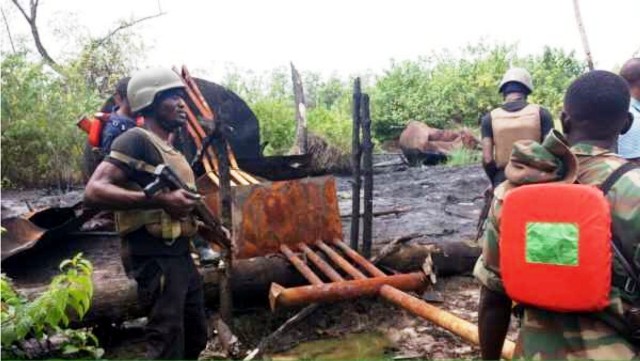Editorial
Of JTF , Illegal Refineries And The Environment

As part of the promises made by the Federal Government during its on-going tour of the Niger Delta region, the Acting President, Prof. Yemi Osinbajo, said operators of illegal refineries in the region would soon be incorporated into the formal crude oil refining sector. The Acting President made the promise during a two-day visit to Rivers State, recently.
This decision by the Federal Government to discourage illegal refineries through the establishment of what it calls “modular refineries” is a welcome development, in view of the huge benefits the Niger Delta region stands to gain from such initiative.
While The Tide welcomes efforts by government to secure the oil and gas sector of the nation’s economy from all forms of criminal activities, we make haste to call for caution against the use of bizarre approach by the Joint Military Task Force in the destruction of illegal refineries because of its negative impact on the people and the environment.
We observe with dismay that in a bid to stop the business of illegal refineries in the Niger Delta region, the Joint Military Task Force has further compounded the environmental degradation of the region by destroying these illegal refineries without considering the negative impacts of such destruction on the people and the environment.
Recently, the Media Coordinator of the Joint Military Task Force for the Niger Delta region, code-named Operation Delta Safe (OPDS), Major Abubakar Abdullahi, confirmed the destruction of two illegal refineries along Lapase Creek in Warri South Local Government Area of Delta State where eleven metal tanks, five dug pits with about 1750 tons of suspected stolen crude oil and 170 tons of illegally refined AGO were impounded.
Within this period too, another illegal refinery with multiple dumps was also destroyed by the task force at Alakiri in Rivers State.
There is no gainsaying the fact that the well-endowed ecosystem of the Niger Delta with its huge potentials of sustaining abundant flora and fauna, as well as wide variety of agricultural opportunities, has been thoroughly abused and degraded since oil and gas operations began in the 1950s.
It is against this backdrop we believe that the over 20 million inhabitants of the Niger Delta region, stretching over 70,000 square kilometers cannot continue to be exposed to these human induced environmental and health hazards. Already, the amount of harm done to both the environment and the people since the advent of oil and gas exploration in the region is really enormous.
The Federal Government needs not be reminded that the Niger Delta environment is already subjected to all manners of degradation, ranging from gas flaring to oil spillage; therefore, any further emission of hydrocarbon into the environment through burning of illegal refineries and products should be suspended.
We say this because Section 7 of the Hydrocarbon Oil Refineries Act of 1990 (as amended) does not encourage setting illegal refineries ablaze, but expects that any person caught operating an illegal refinery must go through the process of criminal trial and conviction.
Aside the fact that the destruction is done in contravention of the law by the government itself, due regard is never given to the consequences of hydrocarbon fire resulting in the burning of the illegal refineries on the environment as well as human health.
More so, the destruction being carried out by the Joint Military Task Force without regard to the environment negates its core mandate which is “to protect oil and gas infrastructure, deter and prevent sea robbery, crude oil theft and other criminalities that could impact negatively on the economic activities in the Niger Delta.”
The Tide considers it worrisome that since the inception of the oil industry in Nigeria, more than fifty years ago, there has been no demonstration of genuine concern on the part of government, let alone the oil operators, to effectively control environmental and health problems associated with the industry.
We, therefore, enjoin the Federal Government to tailor its security operations in the Niger Delta region in line with the law and global best practtices and enforce such against culprits without necessarily affecting the environment. Meanwhile, efforts should also be made to speedily establish the modular refineries to incorporate operators of illegal refineries as announced by the Acting President
That way, health risks and hazards posed by the burning of illegal refineries will be curtailed and the sector opened for more participation of the citizenry to achieved healthy economic growth.
Editorial
Resolve Rumuwoji Market Issues, Others

Editorial
As NDG Ends Season 2

Editorial
Beginning A New Dawn At RSNC

-
Politics3 days ago
2027: NIGERIANS FAULT INEC ON DIGITAL MEMBERSHIP REGISTER DIRECTIVE
-

 Environment3 days ago
Environment3 days agoLAWMA Director Says Sweeping Reforms Have Improved Waste Collection
-
Politics3 days ago
LP Crisis: Ex-NWC Member Dumps Dumps Abure Faction
-

 Politics3 days ago
Politics3 days agoUmahi Dismisses Allegations On Social Media, Insists On Projects Delivery
-

 Sports3 days ago
Sports3 days agoAbia Not Sure To Secure continental Ticket
-
Politics3 days ago
NATASHA ELECTRIC VEHICLES INITIATIVE IN KOGI CENTRAL
-
Sports3 days ago
La Liga: Yamal Records First Career Hat-trick
-

 Sports3 days ago
Sports3 days agoPSG Extend Lead In Ligue 1

